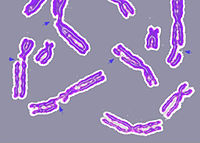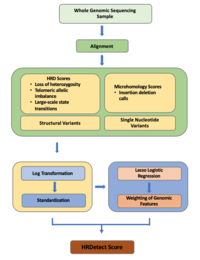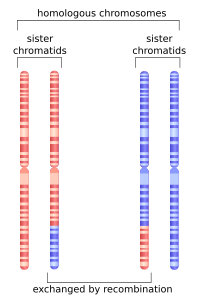
Pan-cancer landscape of homologous recombination deficiency
Sign Up to like & getrecommendations! Published in 2020 at "Nature Communications"
DOI: 10.1038/s41467-020-19406-4
Abstract: Homologous recombination deficiency (HRD) results in impaired double strand break repair and is a frequent driver of tumorigenesis. Here, we develop a genome-wide mutational scar-based pan-cancer Classifier of HOmologous Recombination Deficiency (CHORD) that can discriminate… read more here.
Keywords: cancer; pan cancer; homologous recombination; recombination deficiency ... See more keywords

Identification of molecular subtypes and prognostic signature for hepatocellular carcinoma based on genes associated with homologous recombination deficiency
Sign Up to like & getrecommendations! Published in 2021 at "Scientific Reports"
DOI: 10.1038/s41598-021-03432-3
Abstract: Hepatocellular carcinoma (HCC) is a rapidly developing digestive tract carcinoma. The prognosis of patients and side effects caused by clinical treatment should be better improved. Nonnegative matrix factorization (NMF) clustering was performed using 109 homologous… read more here.
Keywords: hepatocellular carcinoma; signature; molecular subtypes; homologous recombination ... See more keywords

ShallowHRD: detection of homologous recombination deficiency from shallow whole genome sequencing
Sign Up to like & getrecommendations! Published in 2020 at "Bioinformatics"
DOI: 10.1093/bioinformatics/btaa261
Abstract: Abstract Summary We introduce shallowHRD, a software tool to evaluate tumor homologous recombination deficiency (HRD) based on whole genome sequencing (WGS) at low coverage (shallow WGS or sWGS; ∼1X coverage). The tool, based on mining… read more here.
Keywords: recombination deficiency; homologous recombination; whole genome; genome sequencing ... See more keywords

Niraparib maintenance in frontline management of ovarian cancer: a cost effectiveness analysis
Sign Up to like & getrecommendations! Published in 2020 at "International Journal of Gynecological Cancer"
DOI: 10.1136/ijgc-2020-001550
Abstract: Objectives Niraparib maintenance after frontline chemotherapy for advanced ovarian cancer extends progression free survival. The objective of this study was to determine the cost effectiveness of niraparib maintenance therapy in patients with newly diagnosed ovarian… read more here.
Keywords: homologous recombination; maintenance; cost; recombination deficiency ... See more keywords

Abstract 2149: A whole genome sequencing classifier of homologous recombination deficiency
Sign Up to like & getrecommendations! Published in 2023 at "Cancer Research"
DOI: 10.1158/1538-7445.am2023-2149
Abstract: Homologous recombination deficiency (HRd) is a DNA repair defect prevalent in but not exclusive to breast and ovarian cancer most commonly associated with BRCA1 or BRCA2 alterations. HRd results in accumulation of small and large… read more here.
Keywords: genome sequencing; hrd; whole genome; recombination deficiency ... See more keywords

Prevalence of homologous recombination deficiency among all tumor types.
Sign Up to like & getrecommendations! Published in 2017 at "Journal of Clinical Oncology"
DOI: 10.1200/jco.2017.35.15_suppl.1502
Abstract: 1502Background: Triple negative breast and ovarian cancer are known to have a high frequency of homologous recombination deficiencies (HRDef). The prevalence of HRDef among all tumors is unknown. Methods: Molecular profiles of 48,733 tumors obtained… read more here.
Keywords: prevalence homologous; homologous recombination; among tumor; deficiency among ... See more keywords

Homologous recombination deficiency and platinum rechallenge in platinum-resistant ovarian cancer patients.
Sign Up to like & getrecommendations! Published in 2017 at "Journal of Clinical Oncology"
DOI: 10.1200/jco.2017.35.15_suppl.5576
Abstract: 5576Background: Ovarian carcinomas show homologous recombination deficiency (HRD) in up to 50% of cases and in 15 to 20% of cases occur due to germline BRCA1 or BRCA2 mutations. BRCA mutated tumors... read more here.
Keywords: recombination deficiency; homologous recombination; platinum; deficiency platinum ... See more keywords

Effectiveness and Safety of Niraparib as Neoadjuvant Therapy in Advanced Ovarian Cancer With Homologous Recombination Deficiency (NANT): Study Protocol for a Prospective, Multicenter, Exploratory, Phase 2, Single-Arm Study
Sign Up to like & getrecommendations! Published in 2022 at "Frontiers in Oncology"
DOI: 10.3389/fonc.2022.852772
Abstract: Background Ovarian cancer (OC) is a heterogeneous gynecological malignancy with a poor prognosis as the majority of patients are diagnosed at an advanced stage. Neoadjuvant chemotherapy (NACT) followed by interval debulking surgery (IDS) is recommended… read more here.
Keywords: ovarian cancer; niraparib neoadjuvant; recombination deficiency; study ... See more keywords

Toward More Comprehensive Homologous Recombination Deficiency Assays in Ovarian Cancer Part 2: Medical Perspectives
Sign Up to like & getrecommendations! Published in 2022 at "Cancers"
DOI: 10.3390/cancers14041098
Abstract: Simple Summary High-grade serous ovarian cancer (HGSOC—the most frequent and aggressive form of ovarian cancer) represents an important challenge for clinicians. Half of HGSOC cases exhibit homologous recombination deficiency (HRD), mainly through alterations in BRCA1… read more here.
Keywords: ovarian cancer; medical perspectives; recombination deficiency; cancer ... See more keywords

Toward More Comprehensive Homologous Recombination Deficiency Assays in Ovarian Cancer, Part 1: Technical Considerations
Sign Up to like & getrecommendations! Published in 2022 at "Cancers"
DOI: 10.3390/cancers14051132
Abstract: Simple Summary High-grade serous ovarian cancer (HGSOC) is the most frequent and lethal form of ovarian cancer and is associated with homologous recombination deficiency (HRD) in 50% of cases. This specific alteration is associated with… read more here.
Keywords: homologous recombination; recombination deficiency; part; ovarian cancer ... See more keywords

Homologous Recombination Deficiency Scar: Mutations and Beyond—Implications for Precision Oncology
Sign Up to like & getrecommendations! Published in 2022 at "Cancers"
DOI: 10.3390/cancers14174157
Abstract: Simple Summary A characteristic across several cancer types is a homologous recombination deficiency (HRD). HRD is associated with a better response to several anticancer therapies. Adequate assessment of HRD can therefore improve the outcome of… read more here.
Keywords: oncology; scar; hrd; recombination deficiency ... See more keywords